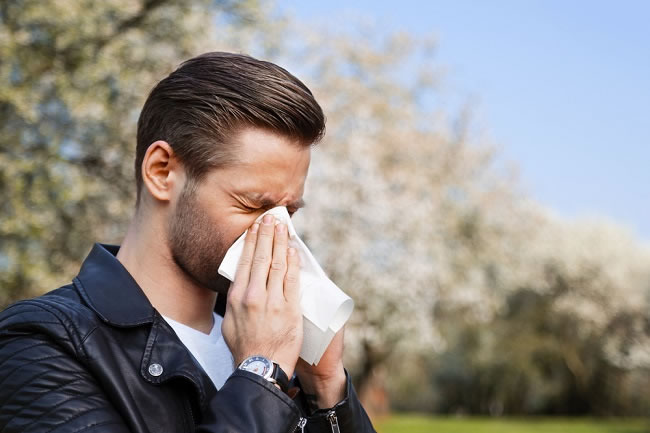1
HOME > Health & Fitness >
DR MICHAEL RUDENKO ON ALLERGIES
WE SPEAK TO THE ALLERGY DOCTOR ABOUT COMMON INTOLERANCES AND THE MYTHS
Written by Peter Brooker in Health & Fitness on the 5th February 2016

For the uninitiated, sometimes it’s hard to know where the line is drawn between allergies and intolerances. I have been known to eat food off the floor and have never used hand sanitizer, I believe my immune system has developed a sturdy enough defence over the years to withstand any attack. Although I have a dramatic reaction any time I hear "There's just no spark between us." For that, there is no cure, however after dating someone with a Yeast Allergy and a Lactose intolerance, I decided to do some research. Basically I wanted to know if she was either genuinely prone to the allergies, a hypochondriac or using her symptoms to deflect my sexual advances. I sought the advice of Dr Michael Rudenko, Medical Director of the London Allergy and Immunology Centre to assist me through the minefield of allergies and intolerances.
What are the most common misconceptions about allergies in the UK?
“When we speak about allergy we define conditions by affected organs and type of allergen that caused problems. Usually allergens that are inhaled cause airborne allergy or hay fever but do not cause gastro-intestinal symptoms, likewise sensitisation to food will be an unlikely cause of any symptoms in the nose and eyes.”

Is this country more aware of allergies as opposed to other European countries or other continents?
“In the UK comparing to mainland Europe, due to previous historical events airborne allergy was treated only symptomatically, while in Europe for the past 100 years people received treatment called desensitisation or specific immunotherapy. The method is quite simple and requires frequent administration of the same specifically manufactured allergen the person is allergic to. This treatment in now available in the UK and can be offered to suitable patients in our centre. Although it is important to mention that this method is only used in airborne allergy and not in food allergy.”
How many people do you encounter that think they have allergies but might only be suffering from a mild form of hypochondria?
“People with gastro-intestinal problems that are frequently labelled as IBS very often say that they are "allergic" to yeasts. But in fact during my 10 years practice in allergy I have seen only two patients with yeast allergy. Majority of problems are either due to genetic conditions associated with lactose or gluten - that we can test for in a blood test, or the primary cause is chronic inflammation that in many cases are caused by bacteria or parasitic infection.”

Did allergies exist centuries ago and we just didn't know about it? It all seems incredibly modern that yeast allergies exist nowadays, and being lactose intolerant is prevalent now but you never heard about it 50 years ago.
“The word "Allergy" was first used by Clemens von Pirquet in 1906. It is very 'young' disease that is now affecting more that 20% of population and is growing very fast. In fact although many people suffer from allergy it is mild in majority of people, and if they stay away from a known allergen they don't experience any symptoms. Minority of people have severe and life threatening symptoms known as anaphylaxis which usually occurs due to sensitisation to food or medication. Intolerances are not life threatening, but can cause significant discomfort to people in their social life. Food intolerance such as digestion problems usually occur because of inability to break down a particular component in food either because of a lack or absence of specific enzyme, for instance lactose in lactose intolerance that is purely determined by genes. In case of gluten we distinct between coeliac disease also a disease with genetic predisposition and bacterial overgrowth resulting in fermentation of gluten if particular bacteria are present in the intestines, at this stage yeasts can start playing a role by increasing this process. Yeast allergy, although it exists is extremely rare.”
How much of it could be misconstrued as narcissism to have an allergy? It gives people the chance to say look at me, how different I am? Although it might appear to be a cynical take on what could be a genuine problem for some, have you ever encountered side of it?
“Occasionally we work with people who think that they have allergies, but in fact they do suffer from problems that are caused but non-allergic mechanisms. Our priority is to make the patient feel better and we try to find the root cause of the symptoms.”

How can people tell they have yeast allergies as opposed to wheat allergies? And is there a cure?
“Yeast allergy is pretty non-existent, but wheat and gluten allergy is quite real. Very often a co-factor is needed to cause symptoms. Such factors can be exercise, painkillers (aspirin), alcohol and exposure to sun or temperature can lead to anaphylaxis.”
Are there cures for any allergies or is it just simply a case of avoiding whatever particular food or drink that person has a reaction to?
“Firstly, before talking about treatment it is important to identify what allergen is causing symptoms. After specific allergen is established avoidance is recommended to avoid symptoms. If the food related reaction was severe we prescribe lifesaving emergency medication - Adrenaline that needs to be with the patient at all times and can be injected in case of accidental exposure. If we speak of airborne allergy, desensitisation can be recommended by an allergy consultant if this method of treatment is indicated.”
How much does a consultation cost these days?
“We see patients on private medical insurance and they only have to pay an excess if one is present on the policy. For self-paying patients allergy tests are around £30 per allergen, while genetic test for lactose or gluten intolerance is £350.”

Trending
2
3
4
5
6
7
8
9
10













